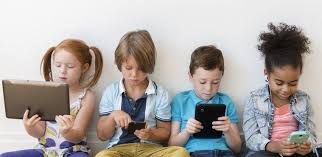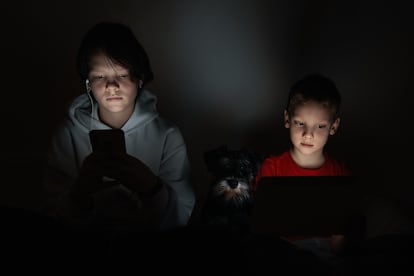Merche Cimas, psychologist: "Families must overcome their fear of setting more limits on screens."

For the psychologist specializing in adolescence and dependence on new technologies, before the age of 14 is not a recommended age for a minor to have their first smartphone because they do not have the cognitive maturity to manage the time of use or the content of social networks.

She is currently immersed in an audiovisual project that will soon be released: the documentary series Disconnected about teenagers and screens for IB3 Televisó, which explores the impact of mobile devices on young people, with real testimonies and considerations from professionals.
QUESTION. According to data from the National Institute of Statistics (INE), the percentage of children between 10 and 15 years old who own a mobile phone has decreased in 2024 compared to the previous year, although only by 1%. What do you think?
ANSWER. The reduction has been very small, and we continue to see discouraging data. Nearly 70% of children at age 12 have a smartphone , and this figure rises to 88% at age 13. These are not recommended ages because, cognitively, children lack the necessary maturity to deal with messaging, social media content, or managing their usage time , and there hasn't been enough time to educate them.
Q. What do you think online interactions offer young people?
A. When they feel isolated or uneasy, we offer them an alternative to letting out their emotions , but we are realizing that the depth of conversation is lost in the online world, since they talk with photos or gifts, leading to a loss of depth.

Q. What attitudes should parents improve regarding cell phone management with their children?
A. Families should overcome their fear of setting more limits on screens . For example, if children sleep with their cell phones, they should establish a rule of leaving them outside the bedroom at bedtime. Or when friends come over, make it a phone-free space for a few hours.
Q. At Christmas or birthdays, screens are the most coveted gift for young people. Do you know if parents usually have conversations before their child or teenager gets a device?
A. Unfortunately, minors are often not educated before their release. They are told about time limits and little else, and it's not enough. We should take advantage of this opportunity when topics like pornography and online gambling come up and educate them about them.
Q. At what age do you think children are ready for their first cell phone? How can parents monitor their activities without intruding?
A. From the age of 14 or 15. Before then, parents with their own phones can educate them from the age of 11 or 12, explaining to them about the content they see or that is shared with them, about fake news... By helping them in this way, they will be more prepared and will better manage their use of social media and the information they see, and parents will not need to be so on top of them and will give them more space.
Q. Do you know if schools raise awareness about the harm that cell phones can cause or if they carry out initiatives to curb their uncontrolled use?
A. There are occasional talks, but not all of them. From my point of view, there should be ongoing training for both students and families so they know about the apps, how artificial intelligence (AI) can be used for homework, the importance of talking to children, and so on. Mobile phone misuse is a public health issue. The impact on children is too significant, and the necessary measures are not being taken.
Q. Do you think a high percentage of children and adolescents seek therapy due to excessive use of the device or because it exacerbates mental health problems already present in children?
A. They don't go to therapy for this reason because they're unaware of their misuse. They come when other associated problems arise, such as academic failure or bad behavior. In girls, this triggers many self-image issues, which often lead to eating disorders. In boys, especially, addiction problems related to video games and YouTubers who are online 24/7 are common. Sleep deprivation is also significant in all children.
Q. What strategies would you recommend to parents and educators to explain to children how being so deeply involved in the digital world can affect them?
A. First, let adults educate themselves. There are many websites where they can do this for free, such as INCIBE and Empantallados , or you can request talks with educators at their schools or institutes. Second, take into account the child's age when giving them a device, encouraging critical thinking about the content and their opinions on certain influencers by watching documentaries, movies, and TV shows on the topic, such as The Social Dilemma, Her, Black Mirror , or Generation Porn . They'll be able to better understand the negative impact, and our guidance will be more effective at 15 than at 11, with the rules that should be set.
ANA FRANCO, El Pais, Spain






